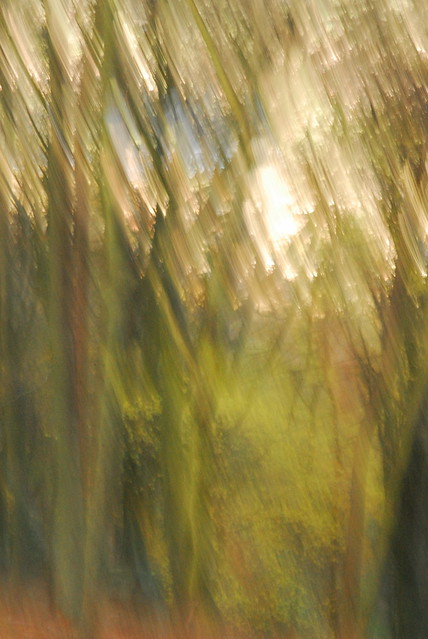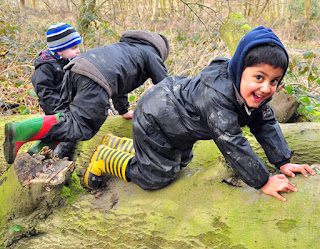In the last few weeks I have been working with people who are really trying to hone down their personal Forest School ethos statements. This has been an ongoing journey for me too and I thought I would share with you a little bit of that journey and extracts from my reflective diaries.
I first took part in Forest School training in 2004. Before then I had been doing lots of wonderful work, where I got to play in woodlands with children and I went into Forest Schools thinking this was a qualification that just underpinned the experience I already had, which was almost true. But a significant element of what was taking place had escaped me. I saw that children were enjoying themselves and we were having fun but I had underestimated the impact we were able to have on children's lives. My reflective diary from that time says:
"Affected by the thought that I am creating an environment in which children can 'open windows and doors' but I hadn't noticed this extra receptivity" "I know I have fully considered the effect of what I do and the relationships that the children foster with the natural environment, but I don't think I realised the impact on the emotional (and social) side of the work I do and my responsibility to the children's emotional well-being. How this realisation effects me in the future will be interesting to see."
This is one of the critical ways in which Forest School differs from all the other wonderful outdoor play and learning that takes place. There is so much good stuff that goes on in lots of schools, settings, uniformed groups and clubs but Forest Schools practitioners have this awareness of the social and emotional impact and the outcomes for each individual child.
The way that the practitioner develops this awareness is through their own training. A number of accredited Forest School training routes exist and the newly emerging UK Forest School National Governing body will be consolidating these. All Forest Schools should be delivered by trained practitioners. Again this doesn't mean that other people don't and shouldn't work outdoors with children. Lots of excellent good quality outdoor play and learning takes place, in lots of different settings and environments, but the deep level of knowledge that practitioners gain through training is what makes Forest Schools unique.
What each person learns from Forest School training is individual, each person who a Forest School course arrives with their personal set of strengths and passions and, through the training, develops these. In 2008 I undertook some further Forest School training. My reflective diary from that time:
"When I look at my life to date, the treehouses we had and the tree climbing we did as kids and wildflower walks with mum, the places I lived in my teens and early twenties, cooking on fires, collecting and chopping wood, living close to the earth and trees. Then getting jobs and work with kids, working for the Wildlife Trust, and now managing and teaching others about quality play provision, there should be nothing that I haven't the mental or physical resource for somewhere. Find the time to find it. Forest School is drawing back together those strands that have become a bit frayed of late."
 |
| Me as a smaller person, still with a stick in my hand. |
I have noticed when I have been delivering Forest School training courses that this is the same for others. Their interest in the ethos is borne out of long and deep experiences but honing all that understanding and turning it into confidence takes time.
This brings together two of those strands; On one hand the holistic development of individual children, child-centred learning and learning through play. Helping children increase their abilities and their capacity to learn, and my role in this, my own pedagogic approach. Then on the other hand the skills. That practical knowledge and ability using real tools and fire. The understanding of the environment you are in and your impact on it and how to make sure that the children you are with are kept safe from serious harm and getting the most out of that environment.

That environment has a crucial part to play. Forest Schools are called Forest Schools for good reason. The
woodland has an equal role in initiating activity, a role it shares equally with the children and with the adults. (I explore this more in this post
here.) A woodland by it's very nature offers a lot; twigs, leaves, stones and cones. It is its own renewable resource for discovery. Simon Nicholson's Theory of Loose Parts (1971) is a real influence on my thinking in this area. As an architect he observed that the more flexible an environment was, the more open ended the resources in it, the more this promoted creativity in the way people used it. It's like when a child plays with the box rather than the gift, and a woodland is the gift and the box! The woodland sets up and offers so much.

"When we crossed the stream into the woods, people's energy levels changed, everyone was excited to be in a bigger more flexible space." "It is only a little strip of woodland but it changes the atmosphere so dramatically." (reflective diary 2008)
The other environment that offers so much affordance is the beach, Nicholson gives beaches as an example of an environment that is naturally rich in loose parts for play. It will be interesting to see how the
Beach Schools qualification develops nationally. It has shared ethos to Forest School but looks at transferring that to the different environment.
The other critical factor is the time that this takes. Forest School programmes seek to work with children for the long term, giving them the time and space to develop their levels of comfort and understanding of what is possible in the woods. The first time a child has been in a woodland it can take time for them to notice the potential. Even for children who feel more confident there is a process of opening up and emerging group dynamics. It takes time to build your understanding of that child and how they are in the woods. This is true for me as a practitioner coming to work with a new group, but it is also true for the teachers, They can work with a child all year but each sees a different side to that person when they are in the woods.
I went to the woods because I wished to live deliberately,
to front only the essential facts of life, and see if I could not learn what it had to teach,
and not, when I came to die, discover that I had not lived.
Henry David Thoreau
·
·





